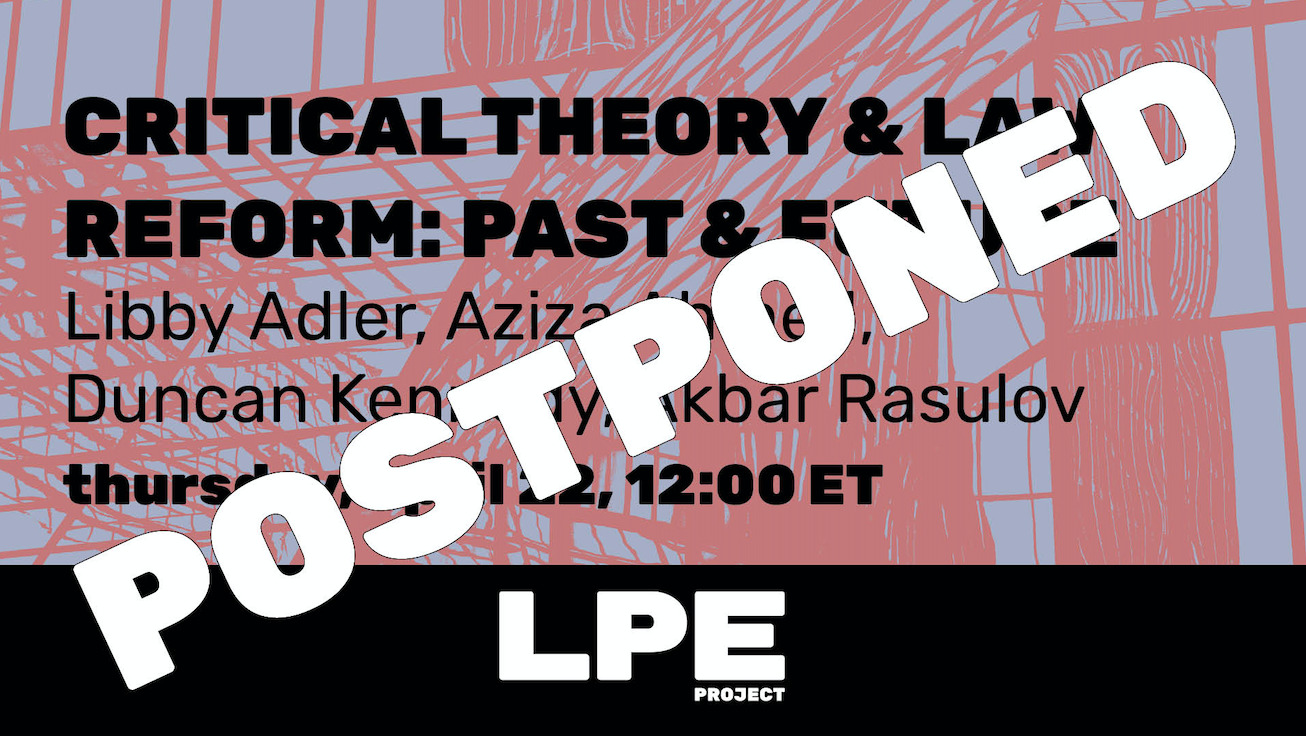Democracy Beyond Neoliberalism
Winter / Spring 2021
The “Law & Political Economy: Democracy Beyond Neoliberalism” Conference is part of a deliberate effort to critically transform legal thought. We are coming together in recognition that “the economy” cannot be separated from questions of power, distribution, and democracy.
The event was originally scheduled to meet at Yale Law School in April 2020 (the original conference line-up is here). Although we were disappointed to have to cancel that in-person event, we are thrilled to proceed with a “virtual” reconstruction, thanks to the perseverance and generosity of our community. Though some participants were not able to join for the virtual reconstruction, those who were, have agreed to either participate in a live video discussion or a blog symposium. The virtual event schedule is below. Please register for the events you would like to attend live. Recordings of each event will also be added to the site for those who cannot attend live.
The “Law & Political Economy: Democracy Beyond Neoliberalism” Conference is part of a deliberate effort to critically transform legal thought. We are coming together in recognition that “the economy” cannot be separated from questions of power, distribution, and democracy. The event was originally scheduled to meet at Yale Law School in April 2020 (the original…
The “Law & Political Economy: Democracy Beyond Neoliberalism” Conference is part of a deliberate effort to critically transform legal thought. We are coming together in recognition that “the economy” cannot be separated from questions of power, distribution, and democracy.
The event was originally scheduled to meet at Yale Law School in April 2020 (the original conference line-up is here). Although we were disappointed to have to cancel that in-person event, we are thrilled to proceed with a “virtual” reconstruction, thanks to the perseverance and generosity of our community. Though some participants were not able to join for the virtual reconstruction, those who were, have agreed to either participate in a live video discussion or a blog symposium. The virtual event schedule is below. Please register for the events you would like to attend live. Recordings of each event will also be added to the site for those who cannot attend live.
We hope the virtual conference will still provide an opportunity for the LPE community (including new voices!) to come together and wrestle with some of the difficult questions of the political moment.
Subscribe For Updates
This panel discussion will focus upon the erosion of democratic institutions and the rise of oligarchy that has followed in the wake of unprecedented economic inequality. The panel will address elite efforts to entrench themselves politically as well as economically, including the consequences of such efforts in terms of human development. The panel will focus upon the specific context of election 2020 and the uncertainty it is creating. The subversion of democracy and the law governing our democracy naturally holds many costs, and each panelist will address such costs. Each panelist will also seek to articulate some mechanism for a path forward.
PANELISTS:
Emma Coleman Jordan, Georgetown Law Center
andré douglas pond cummings, William H. Bowen School of Law
Atiba Ellis, Marquette University Law School
Steven Ramirez, Loyola University of Chicago School of Law
Gerald Torres, Yale Law School
This panel will consider the law-and-macroeconomics of rebuilding the U.S. economy and repairing the nation’s social and political fabric after the global public health and economic shock from COVID-19. The emerging literature at the intersection of law and macroeconomics has tended to focus on crisis response and near-term countercyclical interventions to moderate the effects of the business cycle. We will examine the long-run legal and institutional underpinnings of an economy that is more resilient to future exogenous shocks (including public health and climate shocks), more adaptable to changes in global trade and capital flows, and more effective at addressing the underlying causes of social strife. Topics may include designing a national investment infrastructure, reconsidering the role of the lender of last resort, and identifying macro-relevant elements of legal and regulatory systems needed in the rebuilding effort, with a view to balancing their multiple political, economic, and legal objectives.
This plenary asks a question at the heart of the larger ambition for the conference: How can we build a left vision that gives shape to aspirations for a more radical democracy? Will this vision take the shape of socialism, economic democracy, abolition, or something else? And how might we begin thinking about the role of legal thought, and legal change, in bringing any of these about? What, finally, would it mean to think and practice law in a way that helps us move “beyond neoliberalism”?
Amna Akbar is an Associate Professor of Law at the Ohio State University Moritz College of Law. Prof. Akbar’s scholarship explores the intersections of national security and criminal law, and the potential of social movements to transform our thinking about law, law enforcement, and law reform.
Aziz Rana is the Richard and Lois Cole Professor of Law at Cornell University. Dr. Rana teaches U.S. constitutional law and political development, with a particular focus on how shifting notions of race, citizenship, and empire have shaped legal and political identity since the founding.
Dorothy Roberts is an acclaimed scholar of race, gender, and the law, with joint appointments in the University of Pennsylvania Departments of Africana Studies and Sociology and the Law School, where she holds the inaugural Raymond Pace and Sadie Tanner Mossell Alexander chair. Prof. Robert’s path-breaking work focuses on urgent contemporary issues in health, social justice, and bioethics, especially as they impact the lives of women, children, and African-Americans.
The plenary panel will be moderated by Amy Kapczynski, Professor of Law at Yale Law School and Faculty Co-Director of the LPE Project and the Global Health Justice Partnership.
This panel brings together work in progress from a new generation of legal scholars who explore the link between law and racial capitalism. From a range of vantage points, these scholars investigate and document the central role that race and racism play in constructing the foundation of our modern capitalist economy. Instead of locating racism outside the institutional structure of capitalism, these panelists re-theorize racism as lying at the heart of our country’s economic past and present. This repositioning prompts important questions about the relationship of human freedom and exploitation to the world of so-called “free markets.”
Panelists:
Mehrsa Baradaran (UC Irvine School of Law)
Veena Dubal (UC Hastings School of Law)
Angela Harris (UC Davis School of Law)
Athena Mutua (University at Buffalo School of Law)
K-Sue Park (Georgetown University Law Center)
Daria Roithmayr (USC Gould School of Law)
Inequity-fueled populism, along with financial crises and a pandemic, have disrupted the neoliberal economic order. Its’ legal pillars and institutions are challenged and there are calls to reform both trade and investment law. As the globalization constructed in the 1990s unravels, we must look for new approaches to the world economy. While some think that the current crisis is an aberration and hope to revert to the “golden era” of neoliberalism and the old WTO, this panel argues that there can be no such return. Open markets and restraints on state action did help many emerge from poverty but millions lost jobs or saw wages stagnate. Some countries gained but others fell behind. Promises that trade would promote peace seem hollow as geo-economic tensions escalate. In this panel, four international trade and investment law scholars critique the political economy underpinning the neoliberal regime, outline ways to think about law and world order after neoliberalism, explore how we might build a more democratic and equitable form of globalization, and debate alternative futures.
The presenters will include:
David Trubek, Moderator
Sonia Rolland, “No Calm after the Storm: How Emerging Countries are Moving on from the Neoliberal Order”
Alvaro Santos, “The re-domestication of international investment law: Is Calvo back?”
Dan Danielsen, “Planning for Disruption—Reconceiving Trade and Development to Support Equitable Alternative Futures”
David Singh Grewal, “No Return to ‘Normal’: Why Neoliberal Globalization is Impossible”
This event is co-sponsored by the Center for the Advancement of the Rule of Law in the Americas (CAROLA) at Georgetown Law.
This panel will discuss the complex links between the legal dynamics of money and markets, and their role in economic development and geopolitics. Critical theories of money stress that its legal construction can make or break social transformation. But how elastic is the law of money, especially in ‘peripheral’ financial markets? How does the valuation of money structure international markets and market power, concretely? Critical theories of markets emphasize their coercive functions, especially in structuring economic identity and exchange. Can markets serve as tools of social equity, or even democracy, rather than exploitation? What sort of legal and technological transformations would facilitate this vision? Would they require changes to monetary systems as well as markets? Our panelists will explore these questions and more in depth.
Presenters:
Paula Ahumada (Universidad de Chile School of Law)
Roy Kreitner (Tel Aviv University)
Suresh Naidu (Columbia University)
Talha Syed (Berkeley Law)
Paper Abstracts
As legal scholars and social scientists have begun to center questions of law and political economy, powerbuilding community organizations have also grappled with how to take action to structurally challenge the neoliberal present. This panel will feature reflections about the ways that social movements facilitate democratic engagement (including constitutional interpretation), as well as new forms of political subjectivity. The panelists will also discuss the various ways in which lawyers can support and work alongside social movements, with a specific focus on what LPE scholarship can contribute, and the challenges of bridging the divide between academia and those working directly in organizing.
Presenters:
Willy Forbath (University of Texas at Austin School of Law
Brian Kettenring (Center for Popular Democracy)
Connie Razza (Social & Economic Justice Leaders Project)
Lucie White (Harvard Law School
John Whitlow (CUNY School of Law)
Part of the goal of the project of Law and Political Economy must be to articulate a vision of moral economy that does not rely on neoclassical assumptions about how market competition and consumer choice work and that places progressive values like anti-racism, democratic decisions about conditions of work, and basic social provision for all at its core. This panel begins to ask the question of what such a moral economy would look like, drawing from traditional common law principles about fair business practices, from comparative analysis of other legal regimes, and from recent developments in social theory. The problem is addressed from several angles, bringing rethinkings of antitrust law, corporate law, labor law, public accommodations law, and consumer protection law in conversation with each other with the ambition of opening up space for developing a shared framework.
Presentations:
Luke Herrine (Yale Law School, LPE Project), “Reconstructing Moral Economy in Consumer Law” (based on this recent article)
Sanjukta Paul (Wayne State University Law School), “Moral Economy in the Antimonopoly Tradition and Antitrust Law” (based on this recent article forthcoming in the Yale Law Journal)
Kate Redburn (Yale University), “Moral Economy in Public Accommodations Law”
Marshall Steinbaum (University of Utah), “The Logic of Consumption in Higher Education and the Student Debt Crisis”
Sandeep Vaheesan (Open Markets Institute), “Contracts of Dispossession” (based on this recent article with Matthew Buck)
The papers approach diverse questions using the core tools of historical materialism: a methodological commitment to the historical specificity of the present, yet also as restrained by past developments; the centering of the capitalist mode of production in the analysis of law and a presumption that political economy is determining in the final instance, even in legal fields that are not transparently related to the ‘economy’; a refusal to treat law in its current form as a transhistorical phenomenon, but rather a focus on capitalist forms of legality with a view to discerning both continuity and change; a conviction that ideas alone do not control legal developments and a turn to material relations and struggles in order to understand law as a phenomenon in flux.
At the same time, all papers reject economistic approaches to law and political economy, as well as an impoverished singling out of ‘class’ or ‘the economy’ as the centre of our analysis. Rather, the proposed papers exist within – and draw upon – long traditions of feminist, black or Third Wordlist Marxism. Relatedly, our focus on international law is animated by the conviction that the globe is the only appropriate level of analysis for the capitalist mode of production and its legalities.
Presenters:
Nate Holdren (Drake University), “‘Considerations on Marxist Legal Scholarship and LPE”
Robert Knox (University of Liverpool School of Law and Social Justice), “Debt, Race and the Invention of Structural Adjustment”
Tor Krever (University of Warwick School of Law), “The innermost secret: the political-economic origins of the pirate in international law”
Mai Taha (Goldsmiths University of London School of Law), “Human Rights and the Communists: Reflections on Philosophy and Praxis”
Ntina Tzouvala (Australian National University College of Law), “The Political Economy of International Law between Indeterminacy and Structure”
This panel will explore the connections between economic inequality, global environmental degradation (including but not limited to climate change), and racial discrimination (in all its varied forms). In doing so, the group will showcase expertise across different geographies and landscapes, with some panelists focusing on Indigenous Nations and rural spaces in the U.S. and others engaged with urban environmental inequality at the international scale. Each panelist will comment on the potential promise and limitations of the Biden Administration’s agenda across these areas. Together, the group will critique received environmental, natural resources, and energy law frameworks, and articulate a forward-looking vision for the emerging field of ‘intersectional environmentalism’, informed by political economy critiques and centered on questions of inequality, racial discrimination, and redistribution.
Presentations:
Maxine Burkett (University of Hawaii Law School), “Root & Branch: Climate Migration, Racial Hierarchy, and the History and Future of Climate Justice“
Ann Eisenberg (University of South Carolina Law School), “Rural Resentment and the Regulatory State”
Sarah Krakoff (University of Colorado Law School), “The Political Economy and Geography of the Green New Deal”
Sharmila Murthy (Suffolk Law School), “Multi-scalar Environmental Justice”
Michalyn Steele (Brigham Young University School of Law), “Indigenous Cultural and Environmental Sovereignty”

This panel will explore earlier critical legal theory movements that form the background for LPE today, including critical legal studies (CLS), critical race theory (CRT), and feminist and queer legal theory. CLS distributional analysis borrowed liberally from neo-classical economics, institutional economics and Marxist economics. Key CLS themes included examining legal background rules as targets for structural change, the critique of efficiency analysis in law and economics as a false legitimating discourse, and the analysis of new rights for weak parties as good or bad depending on actual distributive effects.
Critical race theory exposed the role of the law in the production and maintenance of racial categories with profound distributive consequences. And, feminist and queer legal theory demonstrated how family law has been deemed exceptional in thinking about law and political economy and established queer-inflected distributional analysis to examine how gender operates as distributional axis. In drawing out these themes, the authors will make linkages to the ongoing work of the LPE community to uncover the role of law, power, and politics in the construction of political economy and the simultaneous elision of the role of family, race, and gender in the making of economies.
Libby Adler (Northeastern Law)
Aziza Ahmed (Northeastern Law)
Duncan Kennedy (Harvard Law)
Akbar Rasulov (Glasgow School of Law)
The panelists will engage in a roundtable discussion about the formation of legal, political, and economic units, social reproduction, and the state. What forms of autonomy (or interdependence) are required for true freedom or democracy? What structural barriers constrain solidarity among women (and other people) along lines of class, race, sexuality, ability, religion, age, and region? What do movements for suffrage, paid labor in the home, and the socialization of care work, for instance, demonstrate about the U.S. constitution and political economy’s resistance to change? What do recent efforts by corporations and states to recognize alternative family models and a spectrum of social dependency say about the future? Please join us as we explore these questions and more.
Panelists:
Swethaa Ballakrishnen (UC Irvine School of Law)
Deborah Dinner (Emory University School of Law)
Amanda Shanor (Wharton School of the University of Pennsylvania)
Reva Siegel (Yale Law School)
Underlying this political economy of motherhood is both a lack of state support for caregiving and families, with services often linked either to punishment or perceived desert as with drug-using pregnant women and working war widows, respectively; as well as a deeply entrenched view, even among female activists, that a woman’s primary, essential role as a mother is incompatible with her full and equal status in the public sphere.
Panelists will discuss a variety of topics centering on these themes including: the prosecution of women using drugs during pregnancy for ‘fetal assault,’ justified in part for the women’s ‘own good’; the ongoing denial of Constitutional equal rights for women, in large part due to their role as mothers first, and concomitant legal and financial support for working mothers; the punishment of low-income mothers (disproportionately women of color) for ‘child neglect’ that is either typical, harmless parenting conduct or the consequences of a lack of resources and services; and the way that slavery’s legal construction of families and non-families continues to resonate today by according status to certain types of families while excluding others, and treating poor families—particularly low-income Black mothers—differently than affluent ones.
All of these papers demonstrate the double-bind of motherhood—it is used to deny equal pay and political status, but also places women under intense scrutiny to (often single-handedly) provide and care for their children.
Presentations:
Julie Suk (Yale Law School, CUNY Graduate Center), Working Mothers and the Postponement of Women’s Rights, from the 19th Amendment to the ERA
Blog Symposia
Some participants in the original conference chose to transform their panels into thematic symposia for the LPE blog rather than holding live events. These symposia will appear on the blog throughout the semester.

Transforming the Political Economy
FeaturingMartha McCluskey, Lua Kamal Yuille, Ronit Kedar, Hila Keren
Read More
The Neoliberal Republic
Read More
Repurposing the Tools & Methods of Capitalism
FeaturingZach Liscow, Jon Michaels, Julia Mahoney, David Ciepley
Read More
Producing Subjects
FeaturingSusan Dianne Brophy, Honor Brabazon, Anatasia Tataryn
Read More
Political Economy, Political Technology
FeaturingJason Jackson, Jake Goldenfein, Ben Green, Salome Viljoen
Read More
